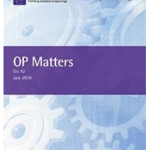Introducing Personality Tasks
An Alternative to Personality Questionnaires
TK Wu and Alan Howard presented a paper about an alternative way of assessing personality at this year’s recent Division of Occupational Psychology Conference.
Mosaic Tasks
The traditional way of assessing personality is by self-report questionnaires. Although this method is useful they do suffer from issues of faking or exaggerated responses, and also everyone has ‘blind spots’. Therefore, we have been researching an alternative approach by devising tasks and measuring personality and behaviours directly.
It drew a lot of interest at the conference, and our sister research company, Quest Assessments Ltd is looking to launch the MOSAIC Tasks later this year.
During the presentation TK mentioned how applying both the questionnaire approach and the task approach can be most revealing to support development i.e. the questionnaire informs us what the individual thinks they are like, and the task approach confirms what they are really like.
Objective Personality Tasks (OPT’s)
Abstract | Introducing Personality Tasks
Personality assessment through self-report personality questionnaires (for example) are often a frequent component of an AC or DC. We present an alternative to personality questionnaires: personality tasks – which draws on the “High-Tech” and “High-Touch” conference theme.
Utilising recent advances in technology, personality assessment can be revolutionised so that one no longer needs to rely solely on questionnaires. Which routinely suffer from distortion such as social desirability responding (Birkeland et al 2006) and errors due to poor self-awareness.
The alternative approach – Objective Personality Tasks or OPTs – builds on the research of Cattell (e.g. Cattell and Warburton 1967). OPTs rely on measuring task performance – but it is the way people complete each task, rather than how well they do on it. This in return reveals their personality traits.
Participants are typically unaware of which aspects of their personality are being assessed. The tasks are relatively short e.g. 5-12 minutes. They are completed online and resemble interesting tasks or challenges that are applicable to all ages and levels of seniority.
We present the results of our own research into the validation of multiple OPT’s using self-report ratings of personality and biodata.

https://shop.bps.org.uk/publications/op-matters-no-42-july-2019.html
To get your copy of this months article in the BPS | OP Matters magazine please use the above link.
